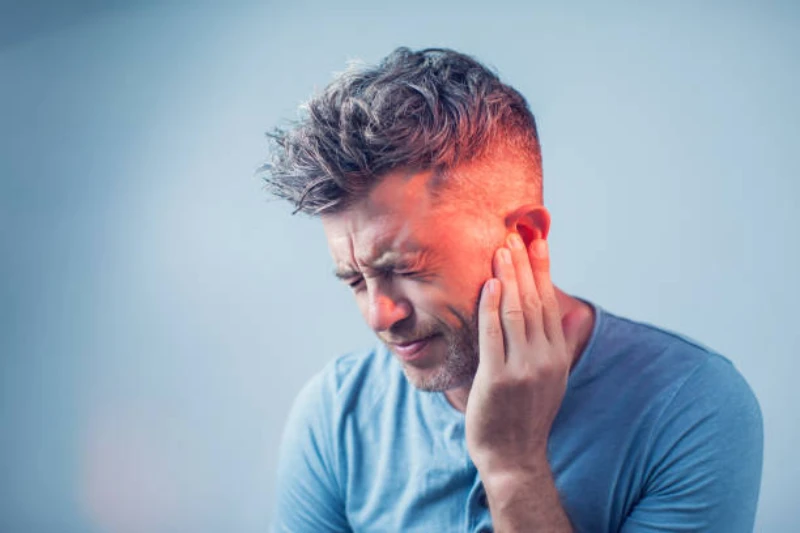Tinnitus is a widespread condition that affects millions of people worldwide. The ringing or buzzing in the ear can be incredibly frustrating and disruptive, and it’s especially challenging for those who struggle with sleep. The negative impact of tinnitus on sleep can exacerbate symptoms and decrease quality of life.
Fortunately, there are ways to get a better night’s rest. You can improve sleep quality and decrease tinnitus symptoms by implementing simple sleep techniques like masking sound, organizing a bedtime routine, practicing relaxation techniques, and disconnecting all electronic devices.
Get a restful night’s sleep even with tinnitus. This informative post gives you all the essential tips and tricks you need.
How to Sleep With Tinnitus: Eight Working Tips
Tinnitus can cause real challenges when getting a good night’s sleep. Fortunately, some tips and tricks can help you get the restful sleep you need to manage your symptoms.
ONE: Masking Sound
To help the brain tune out ringing, white noise or nature sounds played slightly quieter than tinnitus can be used as masking sounds. This method provides background noise that can help the brain adjust and eventually ignore the ringing.
White noise, nature sounds, fans, air conditioners, and soft music are all great options for masking sound.
Smartphone apps have become increasingly popular as they provide easy access to these sounds, allowing individuals to personalize their masking sound to their liking.
TWO: Organize Your Bedtime Routine
Establishing a consistent bedtime routine can help improve the quality of one’s rest and aid in managing symptoms associated with auditory sensations, such as tinnitus. Going to bed on time every night and waking up timely every morning is crucial.
Maintaining your sleep schedule, even on weekends, is equally important. Regular sleep routines can help you manage tinnitus while improving your sleep hygiene.
THREE: Get in the Habit of Relaxing
Developing a habitual routine of relaxing activities before bedtime can potentially improve the quality of rest and promote a calm state of mind. This can be especially crucial for individuals with tinnitus, as the constant ringing or buzzing noise can often interfere with their ability to fall asleep.
Some other strategies to consider include:
- Create a relaxing environment: Ensure the sleeping area is quiet, cool, and comfortable. Consider using earplugs or a white noise machine to mask any unwanted sounds that may exacerbate tinnitus.
- Unwind before bed: Try relaxing activities like reading, taking a warm bath, or meditating. Avoid high-stress activities such as work or exercise close to bedtime.
FOUR: Disconnect All Electronic Devices
Electronics emit a blue light that can interfere with melatonin production, which is a hormone that regulates sleep. The blue light tricks the brain into thinking it is daytime, making it harder to fall asleep and stay asleep.
This can be especially detrimental for individuals with tinnitus, as they may already struggle with falling asleep due to tinnitus in their ears.
FIVE: Reduce Anxiety
Tinnitus can worsen with stress and anxiety, which can be a major barrier to sleep. To reduce the intensity of tinnitus before bedtime, try tablets like Diazepam or other medications prescribed by your doctor. Alternatively, you can try relaxation techniques which can help to reduce stress levels.
SIX: Make Your Bedroom Dark
Another important factor to consider is the amount of light in your bedroom. Bright light can disrupt your body’s natural circadian rhythm and make it harder to fall asleep, especially if you have tinnitus.
This is because tinnitus is often exacerbated by stress and anxiety, which can be triggered by an environment that is not conducive to sleep. Therefore, it is crucial to make your bedroom as dark as possible to promote relaxation and reduce the impact of tinnitus on your sleep.
SEVEN: Lower the Thermostat
As research has shown, maintaining a cool sleeping environment within the optimal temperature range of 60-68 degrees can facilitate deeper and more efficient rest. Lowering the thermostat in your bedroom can promote better sleep and help alleviate tinnitus symptoms.
While adjusting to a cooler sleeping environment may be challenging, wearing socks to bed can provide additional warmth in colder temperatures. The figure of speech ‘keeping your toes toasty’ is not just a catchy phrase, but it has a scientific basis, as it can help regulate the body’s core temperature and promote sleep quality.
EIGHT: Limit Caffeine After Lunchtime
Studies have shown that limiting caffeine consumption after lunchtime can reduce stress and anxiety, promoting more restful and rejuvenating sleep.
To limit caffeine intake, switching to decaf coffee or tea in the afternoon is recommended or choosing alternative beverages altogether, such as herbal tea or water. It is also important to be aware of other sources of caffeine, such as chocolate and some medications, and to avoid consuming them in the evening.
What is the Best Position For Sleeping With Tinnitus?
If you suffer from tinnitus, you may wonder what the best sleeping position is for your ears. While there isn’t a universal answer to this, there are ways to promote better sleep that can help alleviate tinnitus symptoms. It’s important to be mindful of your ear position while sleeping.
When you block off your ears, this can make the sound of ringing or buzzing even worse. Therefore, avoiding sleeping on your stomach or with your ear pressed tightly against your pillow is recommended. It’s possible to sleep better and have fewer tinnitus problems if you sleep on your back or side.
Are Earplugs Helpful for Tinnitus Relief While Sleeping?
Getting a good night’s sleep can be challenging for those with tinnitus due to external noise that can exacerbate symptoms. One possible solution is to use earplugs, which can reduce outside noise and make it easier to drift off.
An added benefit of earplugs is that they can potentially prevent further hearing loss caused by exposure to loud sounds. Since hearing loss can worsen tinnitus, earplugs can be a valuable tool in preventing symptom escalation.
It’s important to choose the right earplugs, however, as not all are created equal. Opt for earplugs specifically designed for sleep, with adequate noise reduction without completely blocking out all sound. A healthcare professional or audiologist can help choose the best earplugs for individual needs.
Sleep in a Peaceful Haven to Reduce Tinnitus Symptoms
Tinnitus can be a challenging condition to live with, especially when it comes to getting a good night’s sleep. Fortunately, several techniques can be beneficial in reducing symptoms and improving sleep quality.
Individuals can promote relaxation and tranquility in the bedroom by creating a peaceful and noise-free environment. Incorporating white noise or soothing music can also help reduce the ear-ringing or buzzing sensation.
Sleeping on one’s side and avoiding pressure on the affected ear can also effectively alleviate tinnitus symptoms. By implementing these tips, individuals can find relief from the frustrations of tinnitus and promote a more restful night’s sleep.





